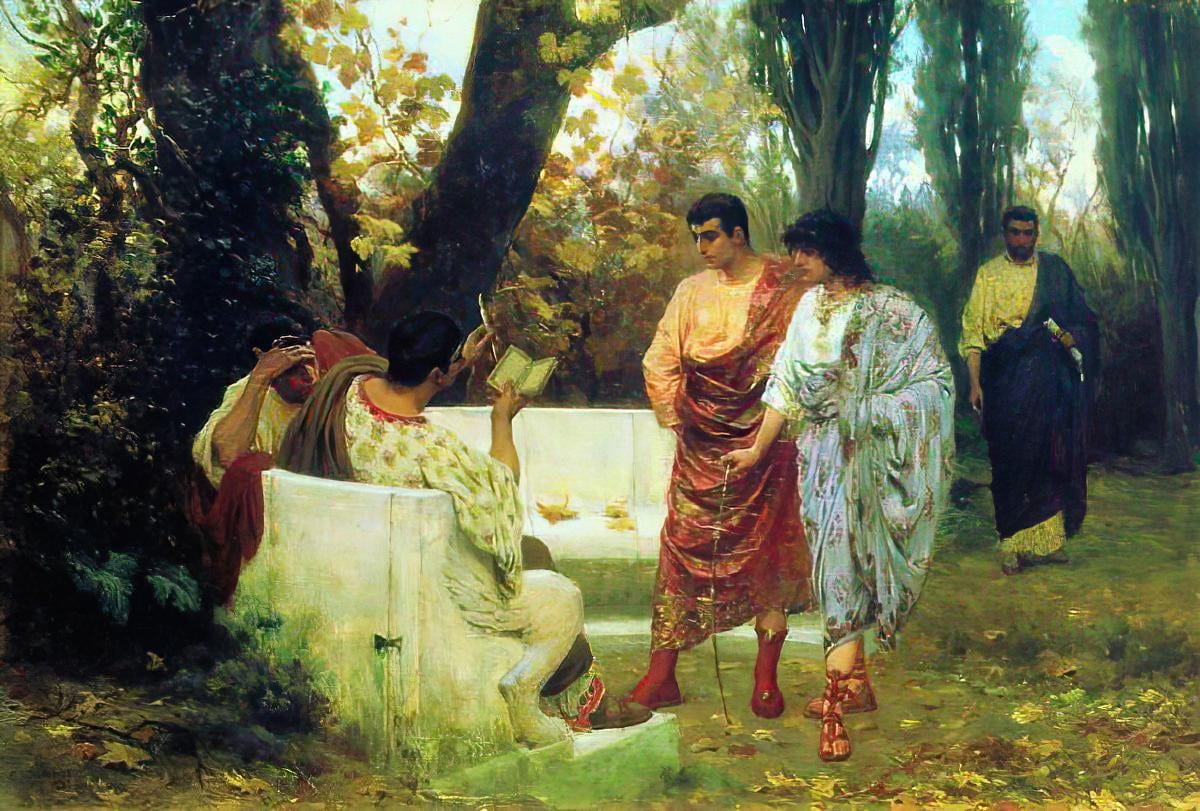Catullus Carmen 5
By Dara Sanchez
Live, laugh, love. A unifying anthem for mothers across America. Yet, in Carmen 5, Catullus finds a way to enthrall us with his amorous descriptions of thousands of kisses. He reminds us of…

Catullus Carmen 5
By Dara Sanchez
Live, laugh, love. A unifying anthem for mothers across America. Yet, in Carmen 5, Catullus finds a way to enthrall us with his amorous descriptions of thousands of kisses. He reminds us of…

Everything Old Is New Again
Returning Translations to Their Original Meanings
By Olivia Wells
Have you ever wondered what’s lost in translation? Now, I could mean this literally or figuratively—here, I ask it literally, in a Classical sense. Is there a straight path from Ancient Greek or Latin to English? Does the context or background of a translator matter? How much faith should we put into a particular translator’s work…

Catullus 101
By Sara Albert
Catullus wrote this elegy while mourning the untimely death of his brother. Despite the fact that he wrote it so long ago, the raw emotion he expresses throughout the piece is timeless and universal. Any reader who has lost someone special to them knows how Catullus felt in the moments he describes…

The Stages of Grief through the Lens of Catullus 101
By Lily Nesvold
There is no easy way to cope with the death of a loved one. Regardless of the circumstances, the devastation that those affected must face is seemingly insurmountable. Personally, I have dealt with the unfortunate passing of my grandfather and great aunt, both of which were great losses for my family. What provided me comfort in these difficult times, however, was turning to those who understood my situation for consolation and support…

By Mati Davis
Sappho 31 and Catullus 51
These two poets focus on the same theme as the previous part of this series: love’s pains. Catullus’ poem 51 hovers somewhere between allusion and direct quotation of Sappho’s poem 31. These two are as interesting for their similarities as for their differences. Even though they follow nearly the same formula, Catullus deftly contrasts Sappho’s romantic euphoria with his own frenzied agony…

Catullus 83
By Lily Nesvold
Overall, I took quite a few liberties in translating this poem. I did keep consistent with the tone of Catullus’ poem by employing a low language register, and I used many derogatory words to emphasize Catullus’ frustration. However, I decided to insert a parenthetical statement after the first two lines to emphasize Catullus’ hatred for Lesbia’s husband. Today, calling someone a “jerk” is so universal in the English language—the reader can instantly assess his character…

Turpis Fausta
By Lily Nesvold
Composed in dactylic hexameter, “Turpis Fausta” is an original work of poetry inspired by a few of Catullus’ pieces: Poem 41 about Mamurra’s ugly mistress; Poem 83, in which Catullus hurls invective at Lesbia’s husband; and Poem 51, showcasing Catullus’ great envy of a mystery man for his ability to capture Lesbia’s attention…

Catullus 85 and Philodemus AP 5.131
By Mati Davis
The famous saying by Horace, “Graecia capta ferum victorem cepit (In being conquered, Greece herself conquered her ferocious conqueror)” (Book II, epistle 1, lines 156-157), describes the way in which Greek art and culture seeped into Roman society and inspired Roman authors, artists, and architects…